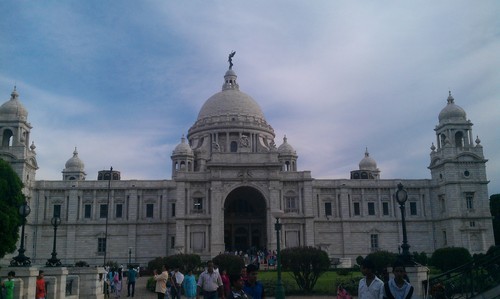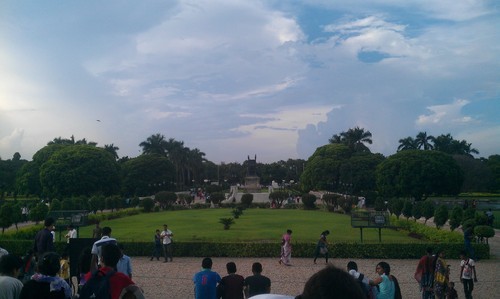

We had no plan in mind when we arrived at the Victoria Memorial.
Desh, our facilitator, Alec (fellow Fulbrighter) and I proceeded to the ticket booth upon arriving at the Victoria Memorial, which sells entrance to the magnificent British Raj era building and its gardens at Rs. 150 for foreigners and Rs. 10 for Indians.
Desh took the lead, thank goodness, telling the security guards in Bangla, “They are Fulbright researchers here to do research at the Memorial. Please let us in.”
“Do you have an appointment?” the guards asked.
“We’ve been in contact Dr. J.S. (the Director of the Memorial). You can call him and check”
We had no appointment. But what we do have is white skin, Fulbright research visas, official documents with plenty of stampy-stampies on them, a good facilitator, and a sense of bravado to get you through almost anywhere.
The security guard called S.’s office saying Fulbright researchers are here. S. was a Fulbrighters himself to the U.S. I think that helped us through.
The guards waved us through free of charge. At the building’s entrance, a member of the staff greeted us, bringing us through a service elevator to the second floor, taking us past signs clearly saying, “Admission Prohibited” and asked us to wait while he gets the Director.
“Do you have an appointment?” he says in Bangla after a moment’s hesitation.
Desh replies, “Yes, we’ve been emailing”
A minute later, we’re ushered in to the director’s office, and make introductions. After a moment of pleasantries, the Director asked, “Have we been in contact?”
A second of awkward silence before I replied, “I’ve been emailing your department.” (True enough, I had been trying to email the director for the last year, but he had changed their email address, unbeknownst to me.)
The most productive meeting in years followed, where I learned that two weeks ago he initiated a project to digitize the records I was looking for, Hyde’s Legal Notebooks, outsourcing the work to Jadavpur University (one of my affiliates). The records are unfortunately off bounds during the process, but there is another copy on microfilm at the national library.
He guaranteed that I would have access to any of the “brittle pages” not available at the National Library once they had been digitized (they won’t be open to the public, but rather as an on-request service for scholars. He also gave me the contact details of the department leading the charge on digitization, as well as a number of relevant scholars in Calcutta and the US.
Pretty cool stuff!!!